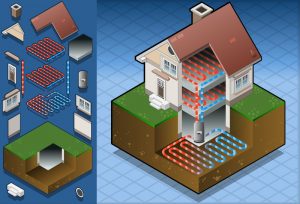 The word geothermal contains the suffix -thermal. If you remember your Ancient Greek root words, or you’ve encountered thermal underwear at some point or know about “thermal detonators” from Star Wars, then you know thermal means heat. Geothermal power has something to do with heat—heat from the earth. (Putting those Greek roots to work again!) So when we tell you about options for geothermal air conditioning for your house, you might wonder if we’ve gone a touch batty. How can a geothermal system work to cool down a home?
The word geothermal contains the suffix -thermal. If you remember your Ancient Greek root words, or you’ve encountered thermal underwear at some point or know about “thermal detonators” from Star Wars, then you know thermal means heat. Geothermal power has something to do with heat—heat from the earth. (Putting those Greek roots to work again!) So when we tell you about options for geothermal air conditioning for your house, you might wonder if we’ve gone a touch batty. How can a geothermal system work to cool down a home?
The answer: extremely well! Geothermal heat pumps are effective ways to provide comfort to a household all through the Michigan year. Like a standard heat pump, a geothermal heat pump brings heat into a building during cold weather and removes heat during warm weather. And it does these jobs at higher efficiency than a standard heat pump.
How does geothermal cooling work?
The process is like a standard heat pump, except instead of using the air outside the building for heat exchange, it uses the earth 10 feet or more underground. This is why geothermal heat pump are often called ground-source heat pumps, as opposed to air-source heat pumps.
A geothermal heat pump circulates a mixture of water and antifreeze through buried coils. During cold weather, the loops draw heat from the ground and move it into the home, where the heat transfers to a chemical refrigerant in the heat pump components to be released into the home. This reverses in the summer: the refrigerant removes heat from the house, transfers it to the loops, and the loops deposit the heat in the ground. In short, a geothermal system can act as an air conditioner by using the earth as a heat sink.
What’s the benefit of cooling a home using geothermal?
Going geothermal offers many benefits, not just for cooling. The main advantage is increased energy efficiency. When it’s 90°F outdoors, it’s harder for an air-source heat pump to move heat outside: the concentration of heat is too high to make it easy. But the temperature below ground remains at a cooler 45°F to 50°F, no matter the weather on the surface. This works even better during winter, when air-source heat pumps can struggle to draw enough warmth from the outside air but geothermal pumps have ample warmth from the earth. A geothermal system, on average, works 3 to 6 times more efficiently than a standard heat pump around the year.
Other advantages of going geothermal include a longer service life (the loops can last more than 50 years) and a lower impact on the environment because of lower emissions.
But is a geothermal system even possible for my property?
The ground loops necessary for a geothermal heat pump take up space, so they can’t be used for every house. But you’d be surprised at how flexible the technology is. Before you decide going with geothermal is impossible, talk to our Fenton, MI geothermal services experts. They’ll help you find the right cooling (and heating) option.
